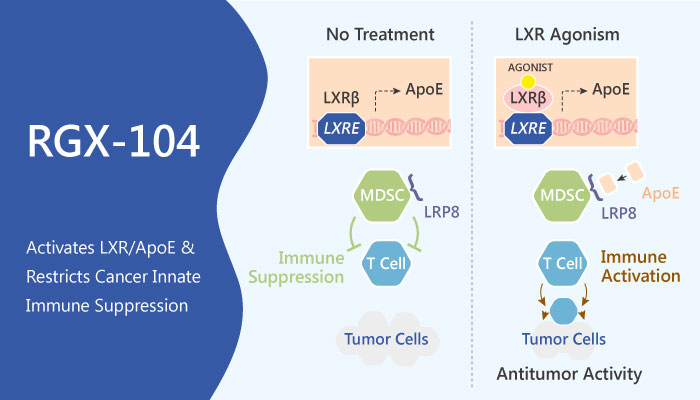In cancer treatment, checkpoint inhibition of adaptive immunity is an important breakthrough of epoch-making significance. However, this therapy doesn’t work to many patients. Interestingly, researchers found that these non-responders usually have high levels of circulating myeloid-derived suppressor cells (MDSCs). MDSCs are a class of immunosuppressive innate cell population. Recently, A study has reported liver-X nuclear receptor (LXR/ApoE) as an ideal target in the suppression of innate immune. LXR/ApoE could suppress tumor growth and reduces MDSC abundance. Therefore, it has potential to become a potential candidate for cancer immunotherapy.

RGX-104 is a strong potent agonist of LXRβ found in the study. Consequently, scientists verified RGX-104 (50 mg/kg) as oral active and could suppress tumor growth in animals bearing large tumors. What’s more, a combination administration of RGX-104 and anti-PD-1 are more effective than either of the single compound in vivo. RGX-104 also shows excellent anti-cancer activity in many cancer models, such as lung cancer and colon cancer. Additionally, RGX-104 also has entered in clinical trials in human subjects. The clinical trials result a progress on standard of care regimens and immune checkpoint inhibitor therapy. During the clinical trial, RGX-104 reveals its activity in depleting MDSCs in human cancer subjects, and activating T cell.
Large numbers of studies have focused on the relationship between immune suppression, cancer progression, and adverse outcomes. In this study, the results also showed that LXR/ApoE signaling restricts cancer innate immune by reducing the number and survival of MDSCs. RGX-104 has the potential to become a new drug for innate immune therapy, and we’re looking forward to it.
Reference:
Cell. 2018 Feb 8;172(4):825-840.e18.